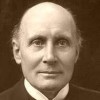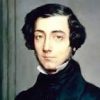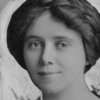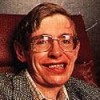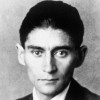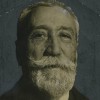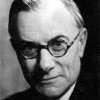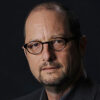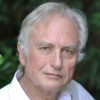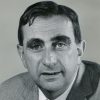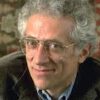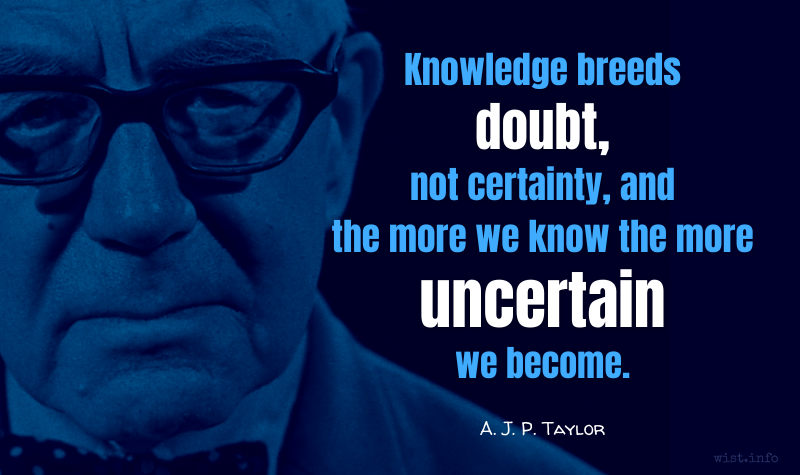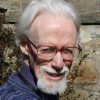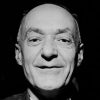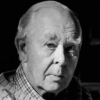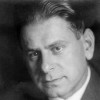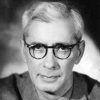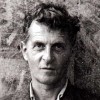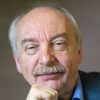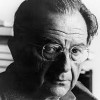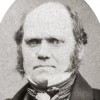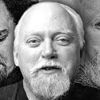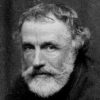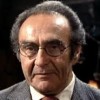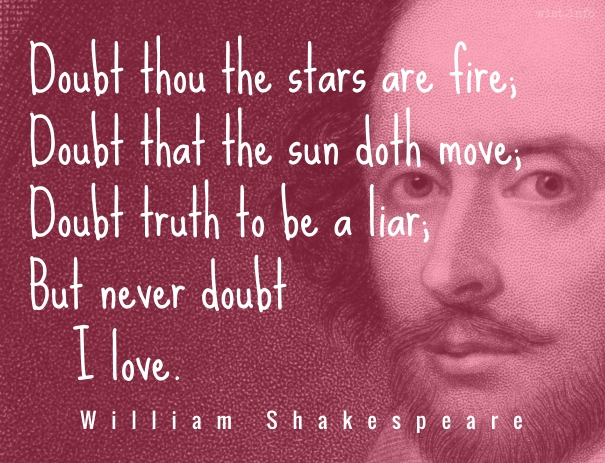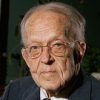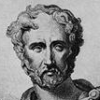How shallow, puny, and imperfect are efforts to sound the depths in the nature of things. In philosophical discussion, the merest hint of dogmatic certainty as to finality of statement is an exhibition of folly.
Alfred North Whitehead (1861-1947) English mathematician and philosopher
Process and Reality: An Essay in Cosmology, Preface (1929)
(Source)
The book is a collection of his Gifford Lectures, University of Edinburgh (1927-1928).
Quotations about:
certainty
Note not all quotations have been tagged, so Search may find additional quotes on this topic.
Nor need we be surprised that men so often embrace almost any doctrines, if they are proclaimed with a voice of absolute assurance. In a universe that we do not understand, but with which we must in one way or another somehow manage to deal; and aware of the conflicting desires that clamorously beset us, between which we must choose, and which we must therefore manage to weigh, we turn in our bewilderment to those who tell us that they have found a path out of the thickets and possess the scales by which to appraise our needs. Over and over again such prophets succeed in converting us to unquestioning acceptance; there is scarcely a monstrous belief that has not had its day and its passionate adherents, so eager are we for safe footholds in our dubious course.
Learned Hand (1872-1961) American jurist
Speech (1955-01-29), “A Fanfare for Prometheus,” American Jewish Committee annual dinner, New York City
(Source)
The demand for certainty is one which is natural to man, but is nevertheless an intellectual vice.
Bertrand Russell (1872-1970) English mathematician and philosopher
“Philosophy for Laymen,” Universities Quarterly (1946-11)
(Source)
Reprinted in Unpopular Essays, ch. 2 (1951).
Fear comes from uncertainty. When we are absolutely certain, whether of our worth or worthlessness, we are almost impervious to fear. Thus a feeling of utter unworthiness can be a source of courage.
Eric Hoffer (1902-1983) American writer, philosopher, longshoreman
The Passionate State of Mind, Aphorism 87 (1955)
(Source)
A hypothesis which permits the prediction of certain effects that always reoccur under certain conditions does, in its way amount to a demonstrable certainty. Even the Newtonian system had no more than such a foundation.
[Une hypothèse qui permet de prévoir certains effets qui se reproduisent toujours ressemble absolument à une vérité démontrée. Le système de Newton ne repose guère sur un autre fondement. Si en réalité et de l aveu du.]
Alexis de Tocqueville (1805-1859) French writer, diplomat, politician
Letter to De Gobineau (1858-08-05)
(Source)
If in the following pages I seem to express myself dogmatically, it is only because I find it very boring to qualify every phrase with an ‘I think’ or ‘to my mind.’ Everything I say is merely an Opinion of my own. The reader can take it or leave it. If he has the patience to read what follows he will see that there is only one thing about which I am certain, and this is that there is very little about which one can be certain.
W. Somerset Maugham (1874-1965) English novelist and playwright [William Somerset Maugham]
The Summing Up, ch. 5 (1938)
(Source)
It is wise to be sure, but otherwise to be too sure.
Sophie Irene Loeb (1876-1929) Ukrainian-American journalist, activist
Epigrams of Eve, “Wise and Otherwise” (1913)
(Source)
It may be that everything we do is determined by some grand unified theory. If that theory has determined that we shall die by hanging, then we shall not drown. But you would have to be awfully sure that you were destined for the gallows to put to sea in a small boat during a storm. I have noticed that even people who claim that everything is predestined and that we can do nothing to change it look before they cross the road. Maybe it’s just that those who don’t look don’t survive to tell the tale.
Stephen Hawking (1942-2018) English physicist, author
“Is Everything Determined?” lecture, Sigma Club Seminar, Cambridge University (1990-04)
(Source)
Reprinted in Black Holes and Baby Universes, and Other Essays, ch. 12 (1994). Hawking's thesis that the universe is actually deterministic, but too complex to be predictable, so acting as though free will exists is useful socially and, like fluid dynamics equations, satisfactory for most purposes.
I lay it down as a general rule, Harriet, that if a woman doubts as to whether she should accept a man or not, she certainly ought to refuse him. If she can hesitate as to ‘Yes,’ she ought to say ‘No’ directly.
When one admits that nothing is certain one must, I think, also admit that some things are much more nearly certain than others. It is much more nearly certain that we are assembled here tonight than it is that this or that political party is in the right. Certainly there are degrees of certainty, and one should be very careful to emphasize that fact, because otherwise one is landed in an utter skepticism, and complete skepticism would, of course, be totally barren and completely useless.
Bertrand Russell (1872-1970) English mathematician and philosopher
“Am I an Atheist or an Agnostic?” sec. “Skepticism” (1949)
(Source)
Originally given as a speech, "Agnosticism v. Atheism," Rationalist Press Assoc. Annual Dinner, London (1949-05-20); then printed as "Agnosticism v. Atheism," The Literary Guide and Rationalist Review (1949-07); then released as an essay under this title later in 1949.
They’re talking about things of which they don’t have the slightest understanding, anyway. It’s only because of their stupidity that they’re able to be so sure of themselves.
Franz Kafka (1883-1924) Czech-Austrian Jewish writer
The Trial, ch. 1 (1925) [tr. Wyllie (2003)]
(Source)
The protagonist Josef K., musing over the minor functionaries who have arrested him on unknown charges.
For most men (till by losing rendered sager)
Will back their own opinions by a wager.
It is the certainty that they possess the truth that makes men cruel.
[C’est la certitude qu’ils tiennent la vérité qui rend les hommes cruels.]
Anatole France (1844-1924) French poet, journalist, novelist, Nobel Laureate [pseud. of Jaques-Anatole-François Thibault]
(Misquotation)
Widely attributed (in French and English) to Anatole France, but not found in his works, including the one location it is sometimes cited from, Les Dieux Ont Soif [The Gods Are Thirsty, The Gods Are Athirst, The Gods Will Have Blood] (1912), in either English translation or, more importantly, in the original French.
While thematically keeping in the novel's depiction of the French Revolution and the Terror, the closest match to the quote I can find is this portion of ch. 22, talking about the expediting of the trials of those charged with counter-revolutionary crimes, eliminating the need to prove a misdeed by simply inquiring as to the accused's beliefs.
Justice thus abbreviated satisfied them; the pace was quickened, and no obstacles were left to fret them. They limited themselves to an inquiry into the opinions of the accused, not conceiving it possible that anyone could think differently from themselves except in pure perversity. Believing themselves the exclusive possessors of truth, wisdom, the quintessence of good, they attributed to their opponents noting but error and evil. They felt themselves all-powerful; they envisaged God.
[tr. Allinson (1913), Jackson (1921)]
Justice, thus curtailed, satisfied them; the pace was quickened and no obstacles were left to confuse them. They confined themselves to inquiring into the opinions of the accused, not conceiving it possible that anyone, except from pure perversity, could think differently from themselves. Believing themselves to possess a monopoly of truth, wisdom and goodness, they attributed to their opponents all error, stupidity and evil. They felt themselves omnipotent: their eyes had seen God.
[tr. Davies (1979)]
La justice abrégée les contentait. Rien, dans sa marche accélérée, ne les troublait plus. Ils s’enquéraient seulement des opinions des accusés, ne concevant pas qu’on pût sans méchanceté penser autrement qu’eux. Comme ils croyaient posséder la vérité, la sagesse, le souverain bien, ils attribuaient à leurs adversaires l’erreur et le mal. Ils se sentaient forts : ils voyaient Dieu.
[Original]
Change is certain. Progress is not.
E. H. Carr (1892-1982) British historian, journalist, international relations theorist [Edward Hallett "Ted" Carr]
(Attributed)
This is widely cited to his collection, From Napoleon to Stalin and Other Essays (1980), but I cannot find it there.
There are few things more dangerous than inbred religious certainty.
I think nobody should be certain of anything. If you’re certain, you’re certainly wrong, because nothing deserves certainty, and so one ought always to hold all one’s beliefs with a certain element of doubt and one ought to be able to act vigorously in spite of the doubt.
Bertrand Russell (1872-1970) English mathematician and philosopher
Interview by Woodrow Wyatt, BBC TV (1959)
(Source)
Collected in Bertrand Russell's BBC Interviews (1959) [UK] and Bertrand Russell Speaks His Mind (1960) [US]. Reprinted (abridged) in The Humanist (1982-11/12), and in Russell Society News, #37 (1983-02).
But what is there in man’s precarious life
To be relied on? o’er the foamy deep
Rides the swift vessel by the wind impell’d:
But as to human fortunes, Time reduces
The great to nothing, and augments the small.Euripides (485?-406? BC) Greek tragic dramatist
Bellerophon [Βελλεροφῶν], frag. 304 (TGF) (c. 430 BC) [tr. Wodhull (1809)]
(Source)
Barnes frag. 117, Musgrave frag. 20. Alternate translations:
Where indeed is there sureness in man's life? For swift ships the winds drive a straight path on the ocean deep, but men's fortunes are changed by the largeness of time, their greatness to nothing, while with increase for the lesser ....
[tr. Collard, Hargreaves, Cropp (1995)]
Where -- where --
for those that die
life’s sure foundation? If we were ships
over the depths of ocean
winds would drive us
straight.
But those that die
their fortune shifts, it veers
in twists of fate -- as Time
(slowly --– slowly) generates itself
at its own leisure
reducing what was great
to nothing – raising up
another ....
[tr. Stevens (2012)]
I conceive that there is nothing which gives a man more pause before taking as absolute what his feelings welcome, and his mind deems plausible, than even the flicker of recollection that something of the sort has been tried before, felt before, disputed before, and for some reason or other has now quite gone into Limbo.
Learned Hand (1872-1961) American jurist
“Sources of Tolerance,” speech, University of Pennsylvania Law School (1930-06)
(Source)
It is often said […] that although there is no positive evidence for the existence of God, nor is there evidence against his existence. So it is best to keep an open mind and be agnostic. At first sight that seems an unassailable position, at least in the weak sense of Pascal’s wager. But on second thoughts it seems a cop-out, because the same could be said of Father Christmas and tooth fairies. There may be fairies at the bottom of the garden. There is no evidence for it, but you can’t prove that there aren’t any, so shouldn’t we be agnostic with respect to fairies?
I hav lived in this world jist long enuff tew look karefully the seckond time into things that i am the most certain ov the fust time.
[I have lived in this world just long enough to look carefully the second time into things that I am the most certain of the first time.]
Josh Billings (1818-1885) American humorist, aphorist [pseud. of Henry Wheeler Shaw]
Everybody’s Friend, Or; Josh Billing’s Encyclopedia and Proverbial Philosophy of Wit and Humor, ch. 152 “Affurisms: Chicken Feed” (1874)
(Source)
The presence of those seeking the truth is infinitely to be preferred to the presence of those who think they’ve found it.
Profound ignorance makes a man dogmatical; he who knows nothing thinks he can teach others what he just now has learned himself.
[C’est la profonde ignorance qui inspire le ton dogmatique. Celui qui ne sait rien croit enseigner aux autres ce qu’il vient d’apprendre lui-même.]
Jean de La Bruyère (1645-1696) French essayist, moralist
The Characters [Les Caractères], ch. 5 “Of Society and Conversation [De la Société et de la Conversation],” § 76 (5.76) (1688) [tr. Van Laun (1885)]
(Source)
(Source (French)). Alternate translations:
Profound Ignorance makes a Man dogmatick. If he knows nothing, he thinks he can teach others what he is to learn himself.
[Bullord ed. (1696)]
Profound Ignorance makes a Man dogmatick; he who knows nothing, thinks he can teach others what he just now has learn'd himself.
[Curll ed. (1713)]
A dogmatic tone is generally inspired by abysmal ignorance. The man who knows nothing thinks he is informing others of something which he has that moment learnt.
[tr. Stewart (1970)]
He is no wise man that will quit a certainty for an uncertainty.
Samuel Johnson (1709-1784) English writer, lexicographer, critic
The Idler, # 57 “The Character of Sophron” (19 May 1759)
(Source)
One of Sophron's (Wisdom's) maxims.
There were four things the Master abstained from entirely: he did not speculate, he did not claim or demand certainty, he was not inflexible, and he was not self-absorbed.
[子絕四、毋意、毋必、毋固、毋我]
Confucius (c. 551- c. 479 BC) Chinese philosopher, sage, politician [孔夫子 (Kǒng Fūzǐ, K'ung Fu-tzu, K'ung Fu Tse), 孔子 (Kǒngzǐ, Chungni), 孔丘 (Kǒng Qiū, K'ung Ch'iu)]
The Analects [論語, 论语, Lúnyǔ], Book 9, verse 4 (9.4) (6th C. BC – 3rd C. AD) [tr. Ames/Rosemont (1998)]
(Source)
Different versions of the Analects take these four items in slightly differing order, reflected in the translations below. (Source (Chinese)). Alternate translations:
There were four things from which the Master was entirely free. He had no foregone conclusions, no arbitrary predeterminations, no obstinacy, and no egoism.
[tr. Legge (1861)]
The Master barred four (words); - he would have no "shall"s, no "must"s, no "certainly"s, no "I"s.
[tr. Jennings (1895)]
There were four things from which Confucius was entirely free : He was free from self-interest, from prepossessions, from bigotry and from egoism.
[tr. Ku Hung-Ming (1898)]
The Master was entirely free from four things: he had no preconceptions, no pre-determinations, no obduracy, and no egoism.
[tr. Soothill (1910)]
He was cut off from four things; he had no prejudices, no categoric imperatives, no obstinacy or no obstinate residues, no time-lags, no egotism.
[tr. Pound (1933); yes, that looks to be five things]
There are four things that the Master wholly eschewed: he took nothing for granted, he was never over-positive, never obstinate, never egotistic.
[tr. Waley (1938)]
The Master recognized four prohibitions; Do not be swayed by personal opinion; recognize no inescapable necessity; do not be stubborn; do not be egotistic.
[tr. Ware (1950)]
He denounced (or tried to avoid completely) four things: arbitrariness of opinions, dogmatism, narrow-mindedness and egotism.
[tr. Lin Yutang (1938)]
There were four things the Master refused to have anything to do with: he refused to entertain conjectures or insist on certainty; he refused to be inflexible or to be egotistical.
[tr. Lau (1979)]
The Master cut out four things. He never took anything for granted, he never insisted on certainty, he was never inflexible and never egotistical.
[tr. Dawson (1993)]
The Master absolutely eschewed four things: capriciousness, dogmatism, willfulness, self-importance.
[tr. Leys (1997)]
The Master was absolutely free from four things: free from conjecture, free from arbitrariness, free from obstinacy, free from egoism.
[tr. Huang (1997)]
Confucius prohibited the four points: no wantonness, no dictatorship, no stubbornness, and no arrogance.
[tr. Cai/Yu (1998)]
The Master avoided four things: no wish, no will, no set, no self.
[tr. Brooks/Brooks (1998); they further interpret, "no fixed opinions, no foregone conclusions, no stubbornness, no self-absorption"]
The Master had freed himself of four things: idle speculation, certainty, inflexibility, and conceit.
[tr. Hinton (1998)]
The Master observed four prohibitions: no willfulness, no obstinacy, no narrow-mindedness, no egotism.
[tr. Watson (2007)]
The Master stayed away from four things: he did not put forth theories or conjectures; he did not think he must be right; he was not obdurate; he was not self-centered.
[tr. Annping Chin (2014)]
Confucius has four ultimate mindsets for perfect: no prejudice, no absolute must, no fixation, no self.
[tr. Li (2020)]
I believe in evil. It is the property of all those who are certain of truth. Despair and fanaticism are only differing manifestations of evil.
Edward Teller (1908-2003) Hungarian-American theoretical physicist
(Attributed)
(Source)
Attributed in a personal communication from Judith Shoolery, in Istvan Hargittai, The Martians of Science: Five Physicists Who Changed the Twentieth Century (2006).
A maxim for the twenty-first century might well be to start not by fighting evil in the name of good, but by attacking the certainties of people who claim always to know where good and evil are to be found. We should struggle not against the devil himself but what allows the devil to live — Manichaean thinking itself.
Tzvetan Todorov (1939-2017) Bulgarian-French historian, philosopher, literary critic, sociologist
Hope and Memory: Reflections on the Twentieth Century, ch. 5 “The Past in the Present” (2003)
(Source)
Paraphrased variant:
We should not be simply fighting evil in the name of good, but struggling against the certainties of people who claim always to know where good and evil are to be found.
To know all about anything is to know how to deal with it under all circumstances. We feel much happier and more secure when we think we know precisely what to do, no matter what happens, than when we have lost our way and do not know where to turn. And if we have supposed ourselves to know all about anything, and to be capable of doing what is fit in regard to it, we naturally do not like to find that we are really ignorant and powerless, that we have to begin again at the beginning, and try to learn what the thing is and how it is to be dealt with — if indeed anything can be learnt about it. It is the sense of power attached to a sense of knowledge that makes men desirous of believing, and afraid of doubting.
William Kingdon Clifford (1845-1879) English mathematician and philosopher
“The Ethics of Belief,” Part 1 “The Duty of Inquiry,” Lecture, London (11 Apr 1876)
(Source)
Knowledge breeds doubt, not certainty, and the more we know the more uncertain we become.
A. J. P. Taylor (1906-1990) British historian, journalist, broadcaster [Alan John Percivale Taylor]
“What Else Indeed?” New York Review of Books (5 Aug 1965)
(Source)
I tore myself away from the safe comfort of certainties through my love for truth — and truth rewarded me.
Simone de Beauvoir (1908-1986) French author, existentialist philosopher, feminist theorist
All Said and Done (1974)
(Source)
A common fallacy in much of the adverse criticism to which science is subjected today is that it claims certainty, infallibility and complete emotional objectivity. It would be more nearly true to say that it is based upon wonder, adventure and hope.
Cyril Norman Hinshelwood (1897-1967) British chemist and Nobel laureate
“Classics among the intellectual disciplines,” Presidential Address to the Classical Association, Hull, UK (1959-04-09)
Quoted in the Sunday Times (1959-05-17), and in E. J. Bowen's obituary of Hinshelwood, in Chemistry in Britain, Vol. 3 (1967), p. 534.
It must be remembered that evidence is never complete, that knowledge of truth is always partial, and that to await certainty is to await eternity.
John Bowlby 1907-1990) British psychologist, psychiatrist, psychoanalyst
Maternal Care and Mental Health (1951)
(Source)
The last phrase is often attributed to Jonas Salk, who used it ("It is said to await certainty is to await eternity") in a telegram to Basil O'Connor (8 Nov 1954). But as Salk himself noted, it was not original to him.
Since we can never know anything for sure, it is simply not worth searching for certainty; but it is well worth searching for truth; and we do this chiefly by searching for mistakes, so that we have to correct them.
Sir Karl Popper (1902-1994) Austrian-British philosopher
“Knowledge and the Shaping of Reality,” lecture, Alpbach (Aug 1982)
(Source)
Reprinted in In Search of a Better World, ch. 1 (1994).
You must have three essentials for the investigation of Chan [Zen]. The first is that you must have the foundation of great faith. The second is that you must have a zealous determination. The third is that you must have the feeling of great doubt. If you omit one of these it is like breaking off the leg of a tripod, which ends up becoming a useless vessel.
高峰云、叅禪須具三要 一有大信根
二有大憤志 三有大疑情 苟闕其一
如折足之鼎 終成廢器。Hyujeong (1520-1604) Korean Seon (Sŏn, Zen) Master [Sosan Taesa, Seosan Daesa, Dae Seonsa]
Mirror of Zen [Samga Gwigam; Samga Kwigom; Seonga Gwigam], ch. 14 [tr. Jorgensen (2012)]
(Source)
Alternate translations:
For the study of Seon, there are three requirements: (1) having the great root of faith; (2) having great determination, and (3) having great doubt. If you lack one of these, it is like a broken like on a tripod sacrificial vessel. In the end you will discard it.
[tr. Miller (2017)]
There are three essentials to Sŏn meditation. First of all, you must be rooted in Great Faith and Great Confidence. Secondly, one must have Great Anger -- a strong, inwardly-directed, ardent determination to practice. Thirdly, one must have Great Doubt. If one of these is missing, it is like a tripod vessel with one leg cut off -- in the end, it will be of no use.
[Source]
It is well known that Ganhwaseon practitioners must have three things of essential importance: The first is a Foundation of Great Faith (大信根) for the practice which is possible; the second is Great Zealous Determination (大憤志) of practice to attain enlightenment; the third is a Great Feeling of Doubt (大疑情) on the Hwadu. If one of these is lacking, then it is like a tripod pot with a broken foot and is useless.
[Source]
What certainty can there be in a Philosophy which consists in as many Hypotheses as there are Phenomena to be explained. To explain all nature is too difficult a task for any one man or even for any one age. ‘Tis much better to do a little with certainty, & leave the rest for others that come after you, than to explain all things by conjecture without making sure of any thing.
Isaac Newton (1642-1727) English physicist and mathematician
Opticks, Preface (unpublished) (1703)
(Source)
Bigotry and science can have no communication with each other, for science begins where bigotry and absolute certainty end. The scientist believes in proof without certainty, the bigot in certainty without proof. Let us never forget that tyranny most often springs from a fanatical faith in the absoluteness of one’s beliefs.
Ashley Montagu (1905-1999) British-American anthropologist and humanist [b. Israel Ehrenberg, a/k/a Montague Francis Ashley-Montagu]
Science and Creationism, Introduction (1984)
The second sentence is frequently (mis)quoted:
- "Science has proof without any certainty. Creationists have certainty without any proof."
- "Religion gives us certainty without proof; science gives us proof without certainty."
As mathematical and absolute certainty is seldom to be attained in human affairs, reason and public utility require that judges and all mankind in forming their opinions of the truth of facts should be regulated by the superior number of the probabilities on the one side or the other whether the amount of these probabilities be expressed in words and arguments or by figures and numbers.
William Murray, 1st Earl of Mansfield (1705-1793) British barrister, politician, judge, legal reformer
In Andrew Stuart, Letters to the Right Honorable Lord Mansfield (1773)
(Source)
A restatement by Stuart of a point Mansfield made.
There is no such thing as absolute certainty, but there is assurance sufficient for the purposes of human life.
John Stuart Mill (1806-1873) English philosopher and economist
On Liberty, ch. 2 “Of the Liberty of Thought and Discussion” (1959)
(Source)
Mill is actually describing an argument he goes on to counter.
Man must accept the responsibility for himself and the fact that only by using his own powers can he give meaning to his life. But meaning does not imply certainty; indeed, the quest for certainty blocks the search for meaning. Uncertainty is the very condition to impel a man to unfold his powers. If he faces the truth without panic, he will recognize that there is no meaning to life except the meaning man gives his life by the unfolding of his powers, by living productively.
Erich Fromm (1900-1980) American psychoanalyst and social philosopher
Man for Himself, ch. 3 (1947)
(Source)
I believe in evil. It is the property of all those who are certain of truth. Despair and fanaticism are only differing manifestations of evil.
Edward Teller (1908-2003) Hungarian-American theoretical physicist
(Attributed)
Quoted in István Hargittai, The Martians of Science: Five Physicists Who Changed the Twentieth Century (2006), via Judith Shoolery.
It has often and confidently been asserted, that man’s origin can never be known: but ignorance more frequently begets confidence than does knowledge: it is those who know little, and not those who know much, who so positively assert that this or that problem will never be solved by science.
ONLY THE MADMAN IS ABSOLUTELY SURE.
Robert Anton Wilson (1932-2007) American author, futurist self-described "agnostic mystic" [pen name of Robert Edward Wilson]
The Eye in the Pyramid (1975) [with Robert Shea]
(Source)
There is nobody, in the commonwealth of learning, who does not profess himself a lover of truth, — and there is not a rational creature, that would not take it amiss, to be thought otherwise of. And yet, for all this, one may truly say, there are very few lovers of truth, for truth-sake, even amongst those who persuade themselves that they are so. How a man may know, whether he be so, in earnest, is worth inquiry; and I think, there is this one unerring mark of it, viz. the not entertaining any proposition with greater assurance than the proofs it is built on will warrant. Whoever goes beyond this measure of assent, it is plain, receives not truth in the love of it, loves not truth for truth-sake, but for some other by-end.
John Locke (1632-1704) English philosopher
An Essay Concerning Human Understanding, Book 4 “Of Knowledge and Opinion,” ch. 19 “Of Enthusiasm,” sec. 1 “Love of truth necessary” (1689)
(Source)
We are never so certain of our knowledge as when we’re dead wrong.
Adair Lara (b. 1952) American writer, columnist, teacher
“A Lot of Knowledge Is Dangerous, Too,” San Francisco Chronicle (9 Oct 1997)
(Source)
The certainties of one age are the problems of the next.
R. H. Tawney (1880-1962) English writer, economist, historian, social critic [Richard Henry Tawney]
Religion and the Rise of Capitalism, ch. 5 (1926)
(Source)
So we have to make guesses in order to give any utility at all to science. In order to avoid simply describing experiments that have been done, we have to propose laws beyond their observed range. There is nothing wrong with that, despite the fact that it makes science uncertain. If you thought before that science was certain — well, that is just an error on your part.
Richard Feynman (1918-1988) American physicist
The Character of Physical Law, ch. 3 “The Great Conservation Principles” (1965)
(Source)
Ah, what a dusty answer gets the soul
When hot for certainties in this our life!
He took my seat and smiled again, like an affable crocodile. He was probably a very principled man, too. So were they all, all principled men. And women. There were few things more annoying than a visibly principled person. Or more troublesome. Most of the ones I’d met could have used a little uncertainty to dilute their principled-ness.
It’s said that science will dehumanize people and turn them into numbers. That’s false, tragically false. Look for yourself. This is the concentration camp and crematorium at Auschwitz. This is where people were turned into numbers. Into this pond were flushed the ashes of some four million people. And that was not done by gas. It was done by arrogance, it was done by dogma, it was done by ignorance. When people believe that they have absolute knowledge, with no test in reality, this is how they behave. This is what men do when they aspire to the knowledge of gods.
HAMLET: Doubt thou the stars are fire;
Doubt that the sun doth move;
Doubt truth to be a liar;
But never doubt I love.
William Shakespeare (1564-1616) English dramatist and poet
Hamlet, Act 2, sc. 2, l. 124ff (2.2.124-127) (c. 1600)
(Source)
A letter from Hamlet to Ophelia, read by Polonius.
I am often inclined to be envious of other people’s religion. They are so cocksure dogmatically that they act as though they are omniscient. Life has no doubts, its direction is determined, all evil is by hypothesis overruled by an all-wise God for good. I do not share this view of life, any more than I share the Christian Science views of disease, but I can see that it makes people enthusiastic, effective, self-forgetful and often fanatical and great bores.
Henry Joel Cadbury (1883-1974) American biblical scholar, Quaker historian, writer, activist
“My Personal Religion,” lecture, Harvard School of Divinity (1936)
(Source)
So as this only point among the rest remaineth sure and certain, namely, that nothing is certaine.
Pliny the Elder (AD 23-79) Roman author, naturalist, philosopher, military commander [Gaius Plinius Secundus]
Historia Naturalis [Natural History], Book 2, ch. 7 (AD 77-79) [tr. Holland (1601)]
(Source)
Often paraphrased, "The only certainty is that nothing is certain."

